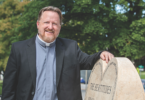
Bill Scholl is the archdiocesan consultant for social justice. You can email him at: socialjustice@archkck.org.
by Bill Scholl
“God created man in his image, in the divine image he created him; male and female he created them” (Gn 1: 27).
If you had to pick a Scripture passage to sum up Catholic social teaching, this would be it (or at least in the top 10). Our fundamental Catholic belief in the innate dignity of the human person stems from God’s revelation that we humans, despite our best efforts to cover it up with our sins, are made in God’s image.
Christ’s revelation of the Trinity tells us more about this image. Namely, that among himself, God is not alone but, rather, is a community. This community is so perfect that God is both one while at the same time three persons, and his image manifests this reality with the creation of male and female (the same in nature, but different; only realizing their perfection when together).
From the revelation of God’s triune nature we come to learn an important thing about ourselves: We humans are made to be in community. We are thus, by nature, political animals. Because we find our good by being with others, we each have a personal sense of how to best achieve the common good: our politics. Perhaps this is why politics make us so passionate, even to the point of dying for a cause. Politics speak to the core of what it means to be human, just as much as our sexuality speaks to our core. It is only by understanding God’s plan for both that we can flourish as humans.
The social teachings of the church are a kind of political morality. Just as sexual morality keeps us from all kinds of trouble and best enables us to be emotionally fulfilled as humans, so political morality keeps us from social harms and helps us to prosper as a community.
Because of our fallen nature, our feelings now seek to rule us. Where there’s passion, there is great propensity for disastrous error. Such is the danger for our politics. When we strive to keep all of our politics in harmony with the sum total of Catholic social teaching, we work for justice. When we break away even in some small way, we open the door for corruption.
The spiritual acid test here is to ask yourself: “Is my faith forming my politics or are my politics forming my faith?” So this Lent, ask this question and give your faith priority. For it is only our willingness to trust in God’s revelation of our destiny through Jesus Christ and his church that we can achieve the best possible lives here and then put them aside for something even better in the hereafter: the perfect politics of life in the Trinity.


